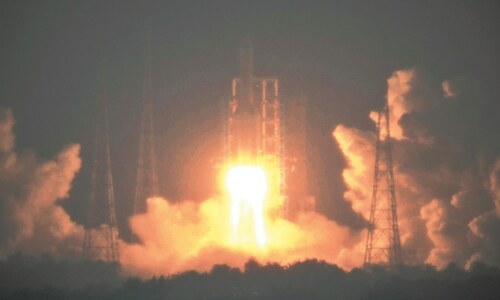
• Economic Coordination Committee summary was signed by Imran
• No normalisation of ties until Delhi reviews Kashmir policy, says FM
• PML-N leader says cabinet has shown ‘no trust’ in PM
ISLAMABAD: A day after the Economic Coordination Committee (ECC) allowed import of sugar, cotton and cotton yarn from India, the federal cabinet on Thursday deferred the decision citing reservations expressed by foreign and interior ministries that there should be no trade with India until it restored the semi-autonomous status of occupied Kashmir.
Interestingly, the summary approved by the ECC regarding trade with India on Wednesday was duly signed by Prime Minister Imran Khan.
However, Minister for Science and Technology Fawad Chaudhry told Dawn after his post-cabinet meeting press conference that the prime minister had signed the summary as minister-in-charge of commerce and textile to allow import of cotton, cotton yarn and sugar from India and placed it before the ECC for approval. “Although the prime minister had signed the summary being a minister-in-charge, the cabinet deferred the decision today,” he added.
Pakistan Muslim League-Nawaz vice president Shahid Khaqan Abbasi said in a statement that the federal cabinet had expressed “no confidence” in the PM by rejecting the decision.
Inside sources said four ministers — Foreign Minister Shah Mahmood Qureshi, Minister for Planning and Development Asad Umar, Human Rights Minister Dr Shireen Mazari and Interior Minister Sheikh Rashid Ahmed — opposed trade with India due to tense situation in held Kashmir.
Fawad Chaudhry said the ECC was a forum which made decisions purely on an economic basis but the cabinet took its decisions keeping in view political, economic and diplomatic conditions. “Technically the ECC is not the government but the federal cabinet is and therefore the cabinet, which is a bigger forum, held the decision the ECC decision in abeyance.”
He said whatever decisions were taken by the ECC, their approval by the federal cabinet was binding.
The minister confirmed that some ministers, including Shah Mahmood Qureshi and Sheikh Rashid, had vehemently opposed any trade with India.
Both Mr Qureshi and Mr Rashid complained that no input of the interior and foreign ministries had been taken on restoration of trade ties with India, which were suspended in Aug 2019 soon after India stripped held Kashmir of semi-autonomous status by revoking Article 370 of its constitution.
Shireen Mazari said in a tweet: “Today cabinet stated clearly no trade with India.”
Interestingly, Prime Minister Khan had earlier made it clear that “there can be no normalisation of relations with India until they reverse their illegal actions” regarding occupied Kashmir taken on Aug 5, 2019.
The foreign minister also said the cabinet had ruled that “normalising relations with India will not be possible” until it overturned the measures it took regarding occupied Kashmir’s special status.
“A perception was emerging that relations with India have moved towards normalisation and trade has been opened,” Qureshi said. “There was an exchange of thoughts on this and there was a unanimous opinion on this and it was the prime minister’s [opinion] as well that as long as India does not review the unilateral steps it took on August 5, 2019, normalising relations with India will not be possible,” he said.
Earlier today, Dr Mazari had said that all ECC decisions “have to be approved by the federal cabinet”. “Only then they can be seen as ‘approved by government’,” she said, adding that the media should be aware of this.
Opening trade with India was the first important decision of recently appointed Finance Minister Hammad Azhar. According to Senator Shibli Faraz, the prime minister was happy and satisfied with the performance of Mr Azhar as minister for industries and production that was why he replaced Dr Hafeez Shaikh as finance minister.
Mr Azhar had made the ECC decision to restore trade ties with India public on Wednesday, saying sugar price in India was “significantly lower than Pakistan; therefore, we have decided to open its trade and allow commercial import of 500,000 tons of white sugar”.
The minister had said the decision was taken to improve supplies and discourage price hike in Pakistan as sugar in India was 15 to 20 per cent cheaper than in Pakistan.
An official statement had said the ECC allowed commercial import of white sugar from India till June 30 through land and sea routes on the basis of the quota issued by the commerce ministry. The decision would be time and cost effective and would also stabilise sugar prices in the domestic markets, it had added.
Asked whether the government had decided not to reopen trade with India because it had denied Pakistan supply of free Covid-19 vaccine, Fawad Chaudhry said this issue did not come under discussion in the cabinet meeting.
Published in Dawn, April 2nd, 2021














































Dear visitor, the comments section is undergoing an overhaul and will return soon.